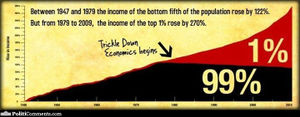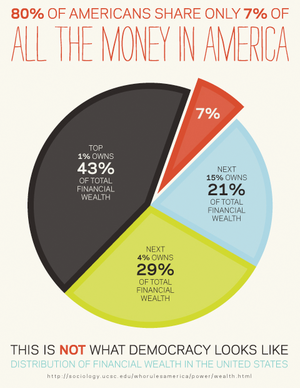The one percent
About
The one percent refers specifically to the top 1% of earners in any given economy -- most commonly the United States, but it can also refer to other countries or even the global economy. More generally, it refers to the fact that a very small segment of society owns a disproportionately large percentage of society's wealth, a disproportionality which intensifies as you look at smaller and smaller pieces of the top percentiles.
This disproportionality is an effect of economic disparity, which has been increasing continuously since the late 1970s when employee wages stopped reflecting continued productivity gains.
Statistics
- The wealthiest 1% own about 40% of the nation's financial wealth. [1]
- The highest-paid 1% of Americans take home 24% of the national income total. [2]
- In 2011, the average CEO made 380 times as much as the average worker. [3]
- In other words: the average employee needed to work more than a month to make what the CEO makes in an hour.
- In 2009, the average CEO only made 189 times as much as the average worker. [4]
- (2012 Super-PACs) The top 1% of donors (about 94 donors) give 54% of the money. [5]
- The gross domestic product of the poorest 48 nations is less than the wealth of the world's richest 3 people. (from image-meme; source needed)
- In 2009, the Forbes 400 -- the wealthiest 0.0000035% of Americans -- had more wealth than the bottom 50% combined. PolitiFact
- In 2010, they had more wealth than the bottom 60% combined -- 400 individuals had more wealth than that possessed by 100 million households.
- The Wal-Mart heirs alone have more wealth than the bottom 40% combined. PolitiFact
- The economic top one percent of the population now owns over 70% of all financial assets, an all time record. AlterNet
Popular Perception
Most Americans falsely believe that income distribution is far more equitable than it actually is, while agreeing that it should be still more equitable than they believe it to be. [6]
Related
Links
Reference
- Wikipedia (redirects to "We are the 99%")
- related: Distribution of wealth
News
to file
- 2013-09-10 Top one percent took record 19.3 percent of US income last year - the LARGEST share of pre-tax income since 1927
- 2013-06-24
- 2013-06-10 Taxing the top 1- by CJ Guest (video)
- 2010-02-16 The Richest 1% Have Captured America's Wealth -- What's It Going to Take to Get It Back? "In 1970, CEOs made $25 for every $1 the average worker made. Due to technological advancements, production and profit levels exploded from 1970 - 2000. With the lion's share of increased profits going to the CEO's, this pay ratio dramatically rose to $90 for CEOs to $1 for the average worker. [..] As ridiculous as that seems, an in-depth study in 2004 on the explosion of CEO pay revealed that, including stock options and other benefits, CEO pay is more accurately $500 to $1." ... "The economic top one percent of the population now owns over 70% of all financial assets, an all time record."

